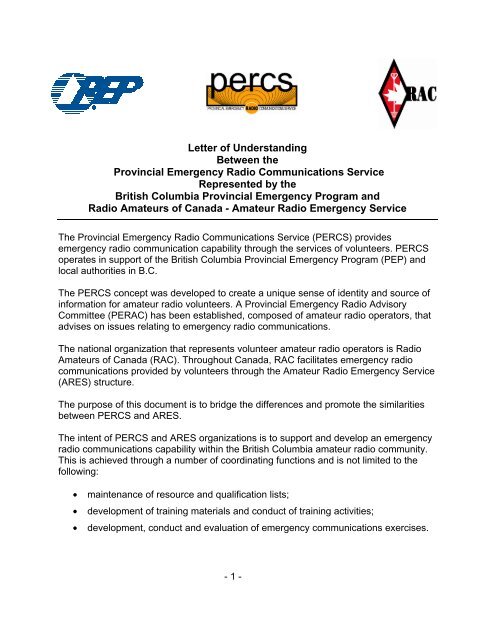Letter of Understanding Between the Provincial Emergency Radio ...
Letter of Understanding Between the Provincial Emergency Radio ...
Letter of Understanding Between the Provincial Emergency Radio ...
Create successful ePaper yourself
Turn your PDF publications into a flip-book with our unique Google optimized e-Paper software.
<strong>Letter</strong> <strong>of</strong> <strong>Understanding</strong><strong>Between</strong> <strong>the</strong><strong>Provincial</strong> <strong>Emergency</strong> <strong>Radio</strong> Communications ServiceRepresented by <strong>the</strong>British Columbia <strong>Provincial</strong> <strong>Emergency</strong> Program and<strong>Radio</strong> Amateurs <strong>of</strong> Canada - Amateur <strong>Radio</strong> <strong>Emergency</strong> ServiceThe <strong>Provincial</strong> <strong>Emergency</strong> <strong>Radio</strong> Communications Service (PERCS) providesemergency radio communication capability through <strong>the</strong> services <strong>of</strong> volunteers. PERCSoperates in support <strong>of</strong> <strong>the</strong> British Columbia <strong>Provincial</strong> <strong>Emergency</strong> Program (PEP) andlocal authorities in B.C.The PERCS concept was developed to create a unique sense <strong>of</strong> identity and source <strong>of</strong>information for amateur radio volunteers. A <strong>Provincial</strong> <strong>Emergency</strong> <strong>Radio</strong> AdvisoryCommittee (PERAC) has been established, composed <strong>of</strong> amateur radio operators, thatadvises on issues relating to emergency radio communications.The national organization that represents volunteer amateur radio operators is <strong>Radio</strong>Amateurs <strong>of</strong> Canada (RAC). Throughout Canada, RAC facilitates emergency radiocommunications provided by volunteers through <strong>the</strong> Amateur <strong>Radio</strong> <strong>Emergency</strong> Service(ARES) structure.The purpose <strong>of</strong> this document is to bridge <strong>the</strong> differences and promote <strong>the</strong> similaritiesbetween PERCS and ARES.The intent <strong>of</strong> PERCS and ARES organizations is to support and develop an emergencyradio communications capability within <strong>the</strong> British Columbia amateur radio community.This is achieved through a number <strong>of</strong> coordinating functions and is not limited to <strong>the</strong>following:• maintenance <strong>of</strong> resource and qualification lists;• development <strong>of</strong> training materials and conduct <strong>of</strong> training activities;• development, conduct and evaluation <strong>of</strong> emergency communications exercises.- 1 -
Beyond amateur radio <strong>the</strong> PERCS structure extends to include o<strong>the</strong>r forms <strong>of</strong> radiocommunication such as licensed commercial, Citizen’s Band (CB), and Family <strong>Radio</strong>Service (FRS) undertaken by volunteers in <strong>the</strong> event <strong>of</strong> an emergency or disaster. It isrecognized however, that <strong>the</strong> level <strong>of</strong> technical knowledge and skill inherent in licensedamateur radio operators will ensure <strong>the</strong>ir leadership role within PERCS and ARES.Background:Amateur radio operators throughout Canada and elsewhere have historicallyvolunteered <strong>the</strong>ir time, equipment and expertise in support <strong>of</strong> disaster and emergencyresponse activities.Some recent situations in which volunteer amateur radio operators have assisted wi<strong>the</strong>mergency communications are:• Hea<strong>the</strong>r Thomas search, Surrey, October, 2000;• Salmon Arm Forest Fire, August, 1998;• Swiss Air Crash, 1999;• Ice Storm in Eastern Canada & USA, December/January 1998;• Symphony <strong>of</strong> Fire, Summers 1998, 1999, 2000;• evacuation <strong>of</strong> residents displaced from fire.Adherence to established organizational and operational standards for <strong>the</strong> conduct <strong>of</strong>emergency radio communications is fostered by <strong>Radio</strong> Amateurs <strong>of</strong> Canada (RAC) inCanada through <strong>the</strong> Amateur <strong>Radio</strong> <strong>Emergency</strong> Service (ARES). During a disaster, <strong>the</strong>standardization <strong>of</strong> procedures for <strong>the</strong> handling <strong>of</strong> formal message traffic facilitates <strong>the</strong>accurate passage <strong>of</strong> information between government and non-governmental agencies.Amateur radio has been recognized by many agencies such as <strong>Emergency</strong> SocialServices (ESS), Red Cross and Salvation Army for its ability to provide an alternatecommunications capability.In times <strong>of</strong> a large scale disaster, amateur radio operators are able to communicate witho<strong>the</strong>r amateur radio operators worldwide to advise <strong>the</strong> status <strong>of</strong> <strong>the</strong> affected area(s),and <strong>the</strong> type <strong>of</strong> assistance required.PERCS AND ARES:This <strong>Letter</strong> <strong>of</strong> <strong>Understanding</strong> (LOU) is being created to clarify <strong>the</strong> terminology, roles andresponsibilities between PERCS and ARES.- 2 -
Parties Involved Agree:1. Members <strong>of</strong> PERCS and ARES will be covered by <strong>the</strong> same principles that are inplace in all Provinces and Territories <strong>of</strong> Canada with regards to RAC/ARES;2. Depending on which National, <strong>Provincial</strong> or Territorial organization has beendesignated as “net control” <strong>the</strong> terminology used by each group may vary. Forexample: Municipal Amateur Coordinator (MAC) in B.C. vs. <strong>Emergency</strong>Coordinator (EC) elsewhere;3. Where different terms are used, a vocabulary list will be developed by PERAC toassist volunteers by providing a definition <strong>of</strong> corresponding terms and <strong>the</strong>irapplicability within <strong>the</strong> PERCS and/or ARES organizations;4. PERCS and/or ARES may promote membership in RAC;5. RAC will promote and support PERCS and ARES;6. Though RAC is headquartered in Ottawa, RAC will encourage B.C. volunteers tosupport and assist PERCS and all o<strong>the</strong>r volunteer activities. PERAC, organizedby PEP will endeavour to maintain and improve a province wide emergency radiocommunication capability;7. PERCS and ARES organizations will maintain links to <strong>the</strong> RAC web site and beprovided access to all articles and training materials available on <strong>the</strong> RAC website;8. RAC will maintain links to <strong>the</strong> PERCS web site and be provided access to allarticles, training materials and organizational materials available on <strong>the</strong> PERCSweb site;9. RAC agrees to consider material for publication in TCA submitted by PERCS;10. PERCS agrees to consider material for publication submitted by RAC;11. Training manuals and message forms will be standardized according to ARESmaterial and will be freely shared between RAC, PERCS and ARES;12. <strong>Emergency</strong> radio communications training in B.C. will be managed by PERCSand ARES. PERCS and ARES will endeavour to ensure compliance with PEPpolicies relating to <strong>the</strong> conduct, funding and support <strong>of</strong> volunteer training;13. Training will be organized by PERAC and submitted for approval to PEP andRAC. Course designation and scheduling will be at <strong>the</strong> request <strong>of</strong> individualmunicipal amateur radio groups or clubs;- 3 -
14. Trainers will present a list <strong>of</strong> participants and a brief outline <strong>of</strong> <strong>the</strong> training course;15. The request for training must include a stated objective for <strong>the</strong> requested training;16. Training costs, if any, will be presented to PERAC in advance <strong>of</strong> any trainingsession. Funding for all training will be at <strong>the</strong> discretion <strong>of</strong> PEP;17. Should a club or group conduct training without PEP funding, a report stating <strong>the</strong>course objectives should be sent to PERCS and ARES through PERAC;18. RAC will allow course materials to be made available to all PEP supportedvolunteer groups and training centers or providers including <strong>the</strong> Justice Institute<strong>of</strong> British Columbia;19. Through <strong>the</strong> British Columbia <strong>Emergency</strong> Response Management System(BCERMS) a standardized model for emergency management and response isbeing developed and has been adopted by all B.C. government agencies;20. Where standardized BCERMS forms are modified to facilitate radio messagehandling <strong>the</strong> format and sequence <strong>of</strong> message headers will comply with acceptedARES standards;21. Message handling practices, procedures and standards developed through <strong>the</strong>adoption and implementation <strong>of</strong> BCERMS will conform to ARES standards for <strong>the</strong>transmission <strong>of</strong> radio message traffic;22. All BCERMS documentation developed to facilitate <strong>the</strong> transmission <strong>of</strong>emergency management information using commercial or amateur radio will beshared with RAC for use by o<strong>the</strong>r jurisdictions.SUMMARY:<strong>Radio</strong> Amateurs <strong>of</strong> Canada (RAC) and <strong>the</strong> <strong>Provincial</strong> <strong>Emergency</strong> <strong>Radio</strong>Communications Service (PERCS) agree to work jointly to provide amateur radiocommunications services to <strong>the</strong> B.C. government emergency response structure and in<strong>the</strong> service <strong>of</strong> <strong>the</strong> public.The <strong>Provincial</strong> <strong>Emergency</strong> <strong>Radio</strong> Advisory Committee (PERAC) agrees to use <strong>the</strong>ARES structure for training and message handling in accordance with PERCSrequirements.RAC agrees to fully acknowledge PERCS and ARES as <strong>the</strong> organizational bodies withinBritish Columbia providing emergency radio communication services.- 4 -
Signed by:Mervin HarrowerDirector, <strong>Provincial</strong> <strong>Emergency</strong> ProgramProvince <strong>of</strong> British ColumbiaDatePierre Mainville, VA3PMVice President Field Services, <strong>Radio</strong> Amateurs <strong>of</strong> CanadaDateKen Oelke, VE6AFOPresident, <strong>Radio</strong> Amateurs <strong>of</strong> CanadaDate- 5 -












